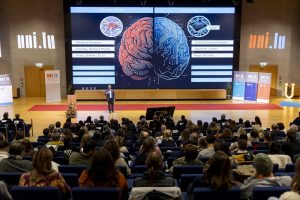Every year, the University welcomes its staff at the Rentrée académique, to celebrate the start of a new academic year and to honour inspiring teachers and students.
Having just celebrated last year the 20th anniversary of the University of Luxembourg, this special evening for students, alumni and staff was also a chance to reflect on current and future trends that will shape education, research, and their impact in society.
Impact of AI in education
“Today’s challenges are complex and interdisciplinary, surpassing individual academic disciplines. In a rapidly changing world, AI and interdisciplinarity – one an enabling technology, one an enabling vision – have the potential to reshape education, teaching and research at a university,” said the Rector Prof. Jens Kreisel. “Students must be equipped to reflect critically, across disciplines and sectors, and to understand the societal, cultural and moral contexts of technological and socio-economic developments. In times of AI, human traits such as creativity, ethics and consciousness remain essential.”
“Studying in the international, multicultural and digital environment of the University of Luxembourg makes it a unique place to study. We are preparing the next generation for the future. That’s what we celebrate in this day.”
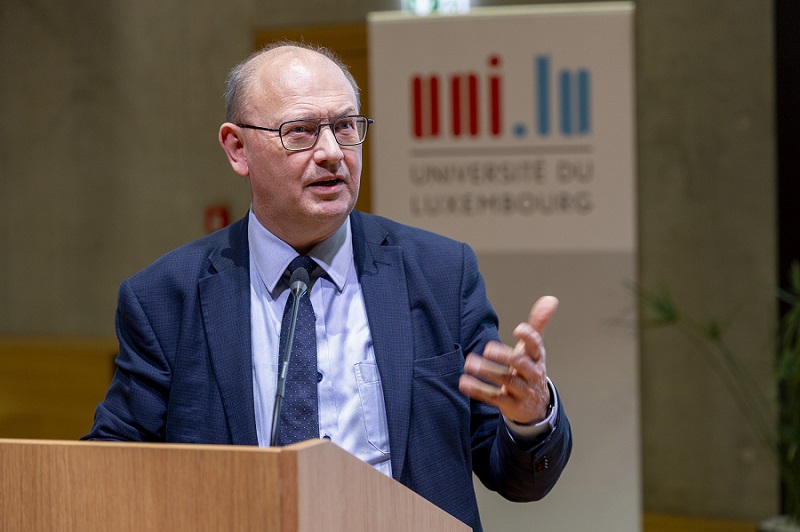
Prof. Philippe Hiligsmann, who just joined the University as its new Vice-rector for Academic and Student affairs, set out his ambition for a holistic approach of education. By putting the individual as a whole – their personal and social development – at the centre of teaching & learning process, the University can enable students to envision their path and to commit themselves to fully play their role as actors in tomorrow’s society. “Our role isn’t just to educate students in specific disciplines, but also to contribute to their personal and social development, such as through extra-curricular activities.”
An Education Innovation Fund and student-led courses
In addition to research projects on the impact of AI in teaching and learning, a new Education Innovation Fund will be launched to support innovative education initiatives by teaching staff, directly contributing to the improvement of teaching practices and the student experience.
Micro-credentials will be introduced and complement existing programs, as well as Student-Led, Individually Created Courses (SLICCs).
The Teaching Awards
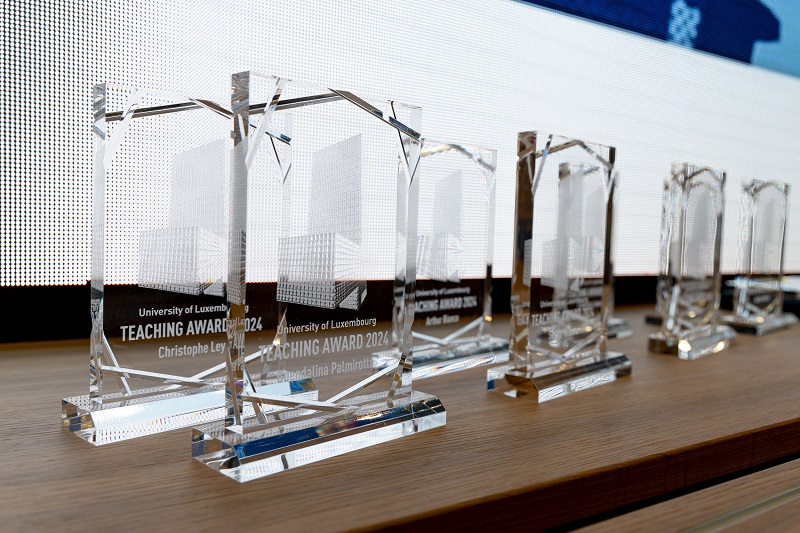
Inspirational teaching is an exceptional skill which requires personal and professional commitment as well as creativity. It is excellent teaching that inspires students, helps them to overcome challenges and to make courageous choices.
Every year, students of each faculty vote for the teachers who inspire and motivate them and create a sense of community in their classroom.
This year, the Teaching Awards go to:
-
Faculty of Science, Technology and Medecine
Dr Guendalina Palmirotta, Postdoc in mathematics and Prof. Christophe Ley, Associate Professor in mathematics.
-
Faculty of Law, Economics and Finance
Arthur Bianco, Doctoral researcher in law, and Prof. Sergio Vicente, Assistant Professor in Finance.
-
Faculty of Humanities, Education and Social Sciences
Dr Natalie Bloch, Research scientist in theatre and intercultural studies, and Prof. Catherine Jones, Assistant Professor in Geography and Spatial Planning.
The Student Awards
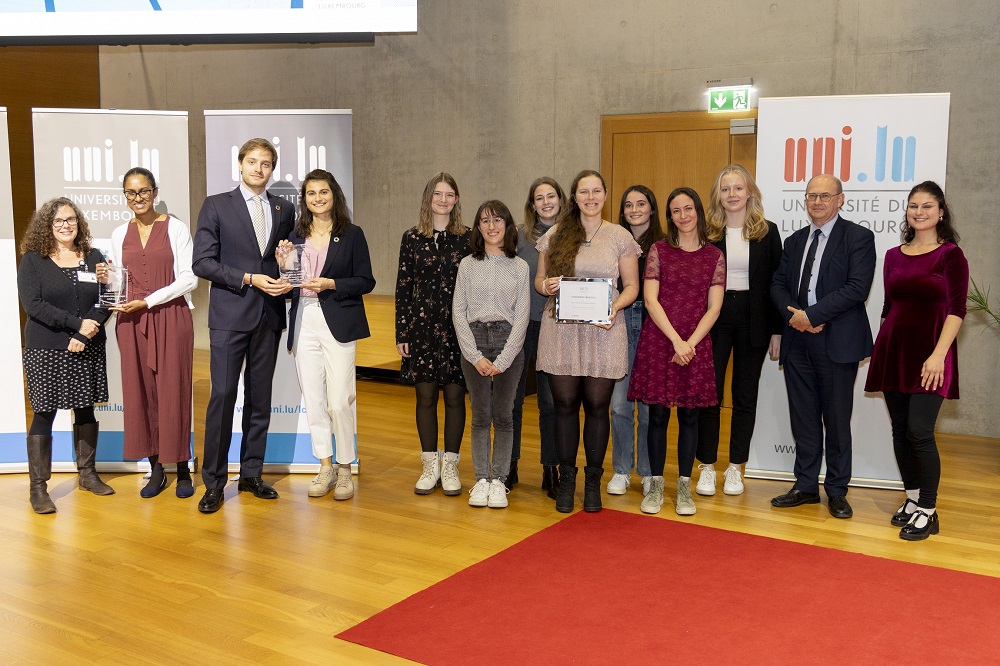
Student Association for Sustainability
Ulisse Saverio Bassi and Vyara Noncheva accepted the Student Award for the work and engagement of the “Student Association for Sustainability”. The recently created organisation aims to raise awareness of sustainability issues and solutions through diverse events and by actively involving students in their activities.
Karinne Madron – Writing Café
Karinne Madron, doctoral researcher in geography and spatial planning with a focus on digital cities, accepted the award for creating the “Writing Café”, a space of retreat and exchange for students and researchers. Watch her colleague’s testimonial.
Mental health café
The student association Fachschaft Psychologie Luxemburg is dedicated to creating meaningful opportunities for students, especially with their mental health cafés.
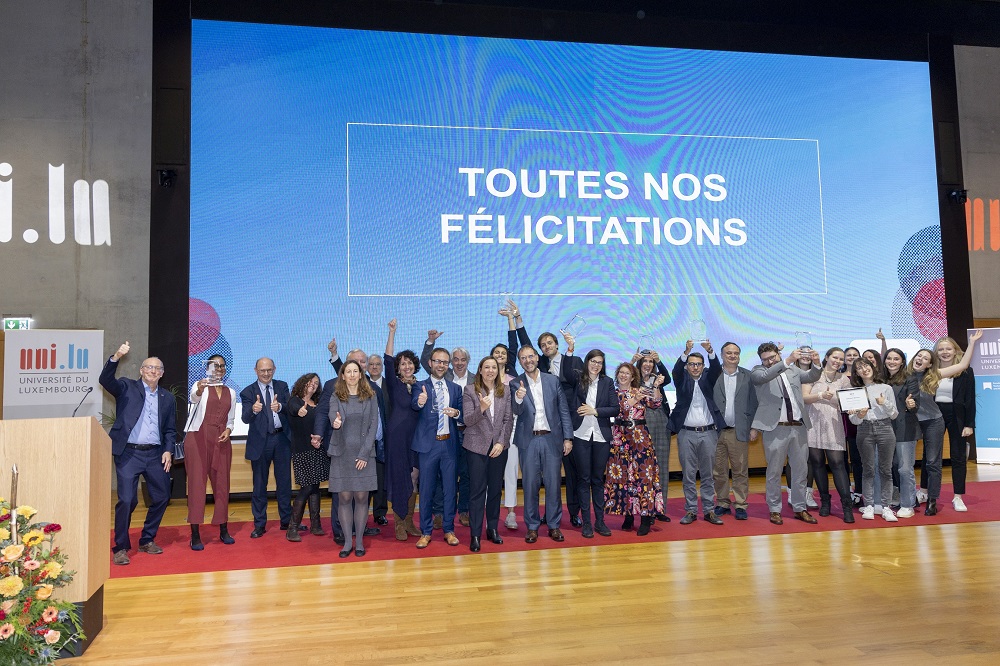
Stéphanie Obertin, Minister for Research and Higher Education, concluded the event by underlining the importance of education for the future of the country, not only for the development of individual skills, but also to strengthen our society. She also underlined the relevance of new research centres Luxembourg Centre for European Law and the Luxembourg Centre for Socio-environmental Systems, to tackle important questions and forge solutions to promote a fair, inclusive and sustainable future.
